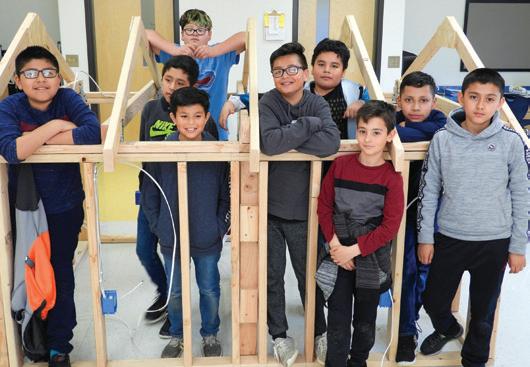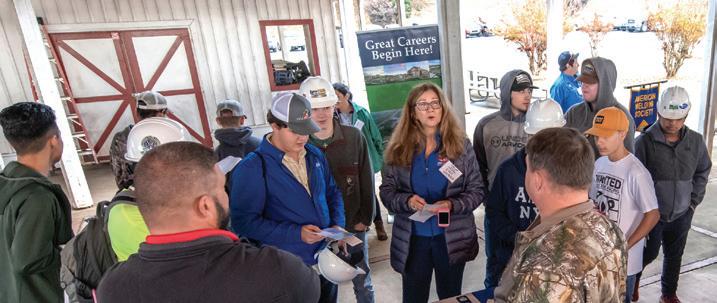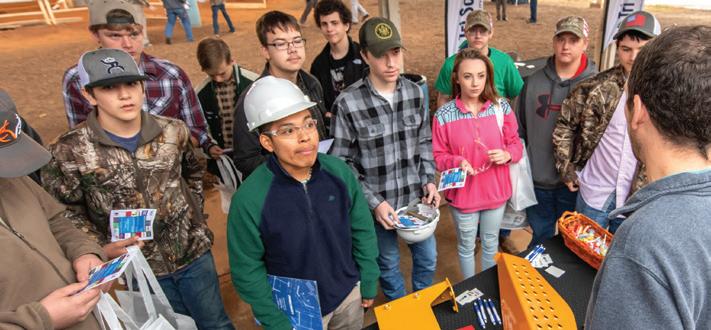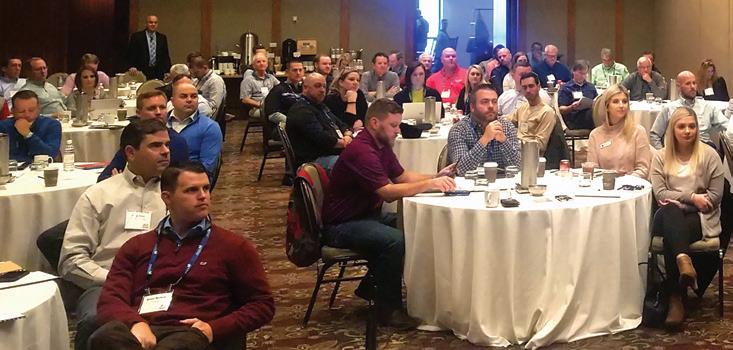
8 minute read
Workforce Development Facts
by agcgeorgia
2021
4:1
For every four people who leave the industry, only one comes in.
2022
1,500,000
296,000 Demand for craft professionals in Georgia through 2022
(Source: Build Your Future Craft Labor Map – www.byf.org)
$
$22.4 BILLION
Annual construction contribution to Georgia’s GDP of $563.6 B
(Source: Simonson, Ken. “The Economic Impact of Construction in the United States and Georgia.” AGC of America, January 25, 2019.)
58,000
$58,000
Average pay for all construction industry employees in Georgia. 10% more than the average for all private-sector employees.
(Source: Simonson, Ken. “The Economic Impact of Construction in the United States and Georgia.” AGC of America, January 25, 2019.)
11% Growth in Georgia’s construction employment in 2018 over previous year.
(Source: Simonson, Ken. “The Economic Impact of Construction in the United States and Georgia.” AGC of America, January 25, 2019.)
A conversation with Governor Kemp shortly after his taking office to share AGC Georgia’s efforts on workforce development and hear his thoughts on how to bring more funding to technical and career education.
90% Construction companies wanting to hire more employees
(Source: AGC of America 2019 Construction Outlook Survey Results for Georgia)
78% Construction companies reporting difficulty finding qualified talent
(Source: AGC of America 2019 Construction Outlook Survey Results for Georgia)
Pride in a job well done is learned at an early age. These elementary school students are building a teeny house and on their way to being our industry’s future stars.
School Programs
WE know that trying to interest college students in construction careers can be difficult. By the time a student reaches high school, they tend to have a preferred career path in mind. We’ve found that it’s easier for students to choose the construction industry when they have been involved in construction projects before they reach high school. In the past several years, AGC Georgia has helped establish a pilot program in elementary and middle schools. It takes help from state government, the state Department of Education, local government and school boards, and our member companies to make the programs work.
What Does It Take to Develop Construction Programs for Elementary & Middle Schools?
• Enthusiastic Educators – AGC Georgia has created fun programs for elementary schools like the Toolbox construction clubs for elementary schools in North Fulton County. Students build “teeny” houses that are just their size. Students and parents who get excited about construction in elementary school are a natural fit for middle and high school programs – often considering careers in our industry. Engaged, supported and enthusiastic teachers make the programs soar.
• State-Level Advocacy – Funding for construction education at all levels comes from many sources, including state government. AGC Georgia enjoys a positive reputation with state agency leaders and the Department of Education, as well as state legislators. We encourage our members to get to know their local legislators. We participate in meetings with agencies like the Georgia State Finance and Investment Commission, the Board of Regents and the Technical College System of Georgia, and their committees. All our efforts are dedicated to helping officials learn more about the construction industry so their decisions are positive ones. Last year, the Georgia Department of Education approved new programs for middle schools. Increasing funding for all school programs is an advocacy priority for next year.
• Local Government – Local school boards are another key source of funding and support. AGC Georgia members work with educators in local schools to create, fund and maintain construction education programs.
• Industry Funding – AGC Georgia member companies consistently donate materials and their time to support construction teachers. Companies gave in excess of $150,000 this year in monetary and in-kind donations.
High School Programs Prepare Students for Skills Challenges & College Studies
WE have worked to strengthen existing high school construction programs across the state and start new ones. Member companies have generously donated both time and materials to these programs and have lobbied their legislators and school boards to increase their reach.
Our advocacy efforts have paid off with the CONNECT act passed last year. This act provides funding through the state appropriations process for capital investments in construction programs. During the 2019 session of the Georgia General Assembly, AGC Georgia was instrumental in securing $500,000 for capital funding needs for construction classrooms and another $220,000 to help fund Extended Day/Extended Year stipends for teachers.
The stipends help teachers dedicate time to growing the number of students who are enrolled in work-based learning programs.
By enhancing construction curriculum at the high school level, students are learning valuable skills to help guide them in their career decisions, as well as compete in Skills Challenges. AGC Georgia hosts and funds four Skills Challenges across the state. AGC Georgia’s Young Leadership Program helps fund participation by our state’s winning high school teams to tattend the national SkillsUSA Competitions.
Over 160 high school construction and welding programs help introduce students to career paths in construction, thus building the industry’s workforce.

New this year!

AGC GEORGIA helped initiate a program called TradeTalks. In partnership with the Georgia Department of Education, construction stakeholders regularly meet with high school counselors to share information on industry career paths and offer hands-on demonstrations for some of the trades. Attendance has grown to 80+ at the meetings. Along with classroom teachers, counselors are a great avenue for the construction industry to partner with in an effort to spread the word about rewarding careers.
What Does It Take to Host Skills Challenges Across the State?
Every year, the competition in the statewide Skills Challenges is fierce. Winning teams take their abilities to the state and national competitions. It takes participation across the AGC Georgia membership to put all the pieces together:
• High School Construction Programs – AGC Georgia serves as a resource to create or sustain high school construction programs.
• Member Participation and Donations – Member firms have given hundreds upon hundreds of volunteer hours to coordinate each of the four regional challenges.

• Advocacy at State and Local Levels – Our relationships with legislators helped create the educational policies and programs to support high school and technical college construction programs.
• Program Certification Committees – AGC Georgia members volunteer to serve on committees tasked with visiting high school and Technical College System of Georgia construction programs that are seeking accreditation by the National Center for Construction Education and Research.
Leading general and specialty contractors and supplier firms are taking ownership of their future by talking to students about opportunities in the industry.

2018 Totals
65 Competing Schools
607 Student Competitors
1,100 Student Observers



$128,451 Total Contributions
165 Sponsoring Firms








College or Technical School
AGC GEORGIA works with state officials in government and higher education to prioritize construction as an essential career choice. Construction is now recognized as part of the state’s High Demand Career Initiative (HDCI). Because of that designation, high school students may enroll in a Dual Enrollment program that allows them to complete college and technical college courses while they are still in high school. Not only do they earn credit that reduces the time needed for an advanced degree, any courses at the technical college system focusing on construction are tuition free.
In addition to skilled trades talent, there is a high demand for young professionals with college degrees inside the construction industry. AGC Georgia partners with local construction management collegiate programs and the members of their AGC Student Chapters.
Three students from Kennesaw State University’s Construction Management AGC Student Chapter earned scholarships from AGC of America’s Education and Research Foundation. It’s an honor to help young people build their career to become tomorrow’s industry leaders.
AGC Georgia also partners with the construction programs at Georgia Tech, Kennesaw State University and Georgia Southern University and their respective AGC student chapters. The association’s support of those student-led organizations helps create connections between the collegians and professionals from all career paths within the association’s membership. The association also provides student memberships to our award-winning Young Leadership Program for $25 a year, which provides free or reduced access to meetings and educational programs. AGC Georgia staff members and representatives from member firms serve on each of the school’s construction management advisory boards.
AGC Georgia member, Brasfield & Gorrie, along with many others offer jobsite tours to students who are both in high school and college. It’s a great opportunity to offer a first-hand understanding of all the different types of skills needed to complete a construction project.

Javier Irizarry, Ph.D., takes time out of his duties as a professor at Georgia Tech to teach the AGC Georgia’s Supervisory Training Program (STP). He spent a day with the group focusing on technology being used on today’s jobsites. He’s pictured offering a demonstration on drones.
Preparing Construction Industry Leaders

DEVELOPING the next generation of leaders and strengthening the skills of industry executives is critical to the industry’s future success. AGC Georgia funds and supports essential programs designed for employees throughout their career and even in retirement. During a recent safety award program, AGC Georgia collected data on the age of our members’ field supervisors. Currently, 55% of the superintendents are over 50 years old and 23% are over 60 years old. While this example focuses on a single segment of our workforce, the same statistics can be applied to our executives, and many other roles within construction companies. Our workforce is aging out and we must be proactive in our efforts to develop the next generation.
Early Career
• Young Leadership Program – Our YLP offers employees a chance to develop leadership skills early in their careers, network with their peer group and establish personal relationships with future industry leaders. YLP sponsors professional development seminars and reduced-cost access to AGC Georgia training programs, and raises money for hand-selected charities benefiting local children, families and veterans.
— YLP Highlights
Celebrating 23 years of leadership development
131 participants
77 companies represented
20+ annual events designed specifically for YLP
15 hours of complimentary professional developments

Over $90,000 in charitable contributions over last 12 months
350+ hours of volunteer work on a host of charitable endeavors
• Safety & Education Highlights
140 safety and education training sessions offered
— Over 1,200 representatives from 300 participating companies
— Approximately 1,100 hours of instruction
• Supervisory Training Program – AGC Georgia is building educational programs designed for jobsite supervisors and foremen. As their mentors retire, these well-trained supervisors will be ready to run projects for the next 20 years. The goal is to have their replacements ready to assume leadership roles in their turn.
Mid-Career to Senior Leadership
When a promising employee reaches the middle of his or her career, they are not eligible for YLP. YLP members graduate out of the program when they turn 40. AGC Georgia developed the Executive Alliance to help those individuals continue their leadership journey.
Executive Alliance – AGC Georgia’s Executive Alliance provides advanced professional development programs and peer-to-peer mentoring and networking. Ideal candidates for this program are senior-level representatives, including those already serving as president or owner, and others who are moving into senior positions in the near future. EA focuses on leadership best practices for representatives of any type of business, not just construction-specific.
• Executive Alliance Highlights
— 46 participants
— 37 companies represented
— 6 annual events designed specifically for EA, including three overnight retreats at Georgia venues
— 12 hours of in-depth training led by sought-after facilitators focusing on topics such as accounting, insurance/bonding, succession planning, building leadership and more!
— 40+ hours of networking with seasoned professionals sharing best practices

Retirement
After a rewarding career in the construction industry, retirees want to know their incomes are secure and their retirement is comfortable. AGC Georgia offers a Retirement Savings Plan to all member companies’ employees. Because the program extends across company lines, we are able to save our members administrative costs, as well as offering excellent investment opportunities.



